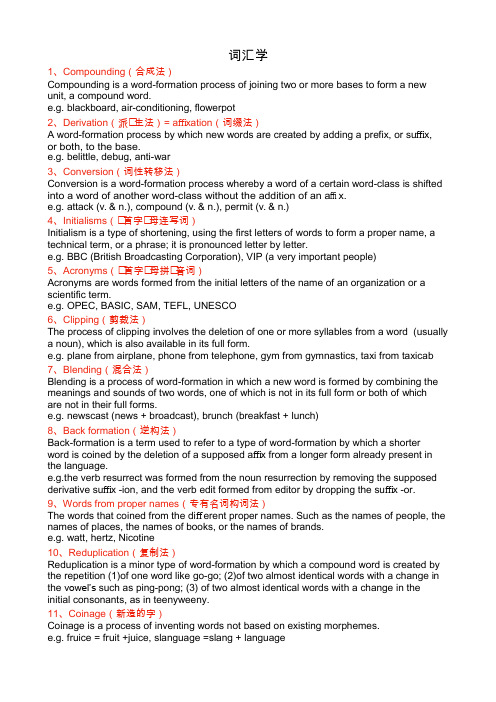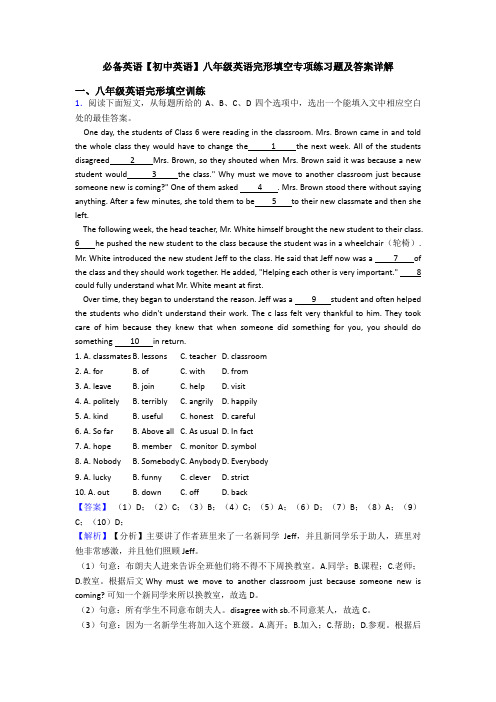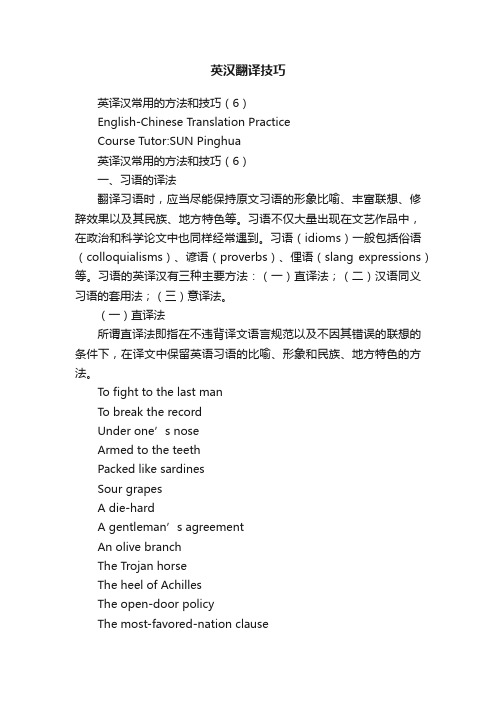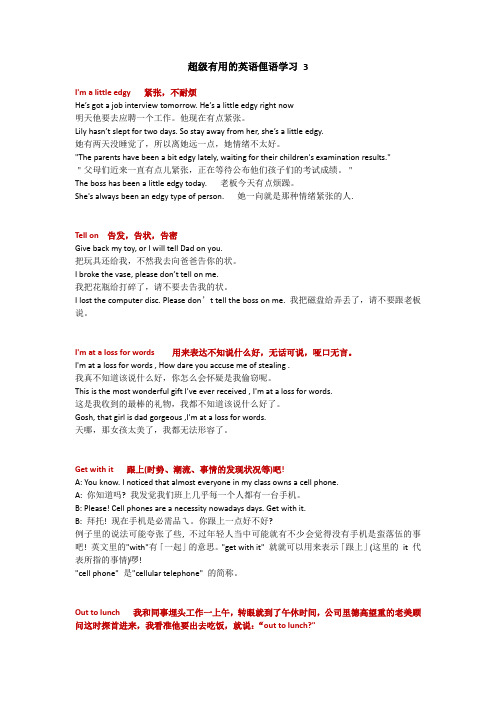Slang words 1
什么是不能说出口的英语:禁忌语与俚语

坏的slang往往更美妙。”
b. 字典英语与生活英语之差异
凡是努力学过英语的人都有一个共同的缺点,那就是不会区别文章与口语。 美国人批评我们的英语是:
classroom English (教室英语)
其中,尤其不便说出口的话有fuck(性交,干),因为刚好是四个字母, 所以禁忌语也可以说成four-letter word(四字经)。此外,shit(大便)是四字,cock(阴茎)也是四字,所以four-letter word有“不便开口的话”之意。
所谓禁忌语并不是现代才有,受迷信或传统支配的古代或原始民族更多, 这是在某种环境或状况下,不便说出口的话。这也不限于淫秽的话,也有正相反的情形。
exaggerated English (夸张的英语)
而我们却不了解他们为什么会这样说。 虽然英美人士告诉我们说他们在日常生活里不使用big words(难字),但很难判断究竟哪些是big words。
一般而言,为表示同样的意思本来有很短的字,但我们喜欢用较长的字, 所以批评说“用太多的big words”或“夸张的英语”。
例如在缅甸或朝鲜、大溪地等国家,国王或皇帝的名字是至高无上, 不可以随便说出口的,日本到今天还是如此,外国的报纸会不客气地说Emperor Hirohito (裕仁天皇)或Prince Akihito(明仁皇太子),但在日本的报纸上却不能写出名字。
并不限于未开发的国家才有禁忌语,例如英国对有关宗教的语言- God( 神 ) 、devil(魔鬼)、Christ(耶稣)等-是除了认真谈话时以外,不可以随便说出口的。
如在开玩笑或轻松的谈话时说:Jesus Christ (耶稣基督) ,一定会被认为你是不懂礼貌的人。
在骂“你是个畜生!”或“可恶的东西!”时,英国人会使用有关神的话。
词汇学名词解释

词汇学1、Compounding(合成法)Compounding is a word-formation process of joining two or more bases to form a new unit, a compound word.e.g. blackboard, air-conditioning, flowerpot2、Derivation(派⽣生法)= affixation(词缀法)A word-formation process by which new words are created by adding a prefix, or suffix,or both, to the base.e.g. belittle, debug, anti-war3、Conversion(词性转移法)Conversion is a word-formation process whereby a word of a certain word-class is shifted into a word of another word-class without the addition of an affix.e.g. attack (v. & n.), compound (v. & n.), permit (v. & n.)4、Initialisms(⾸首字⺟母连写词)Initialism is a type of shortening, using the first letters of words to form a proper name, a technical term, or a phrase; it is pronounced letter by letter.e.g. BBC (British Broadcasting Corporation), VIP (a very important people)5、Acronyms(⾸首字⺟母拼⾳音词)Acronyms are words formed from the initial letters of the name of an organization or a scientific term.e.g. OPEC, BASIC, SAM, TEFL, UNESCO6、Clipping(剪裁法)The process of clipping involves the deletion of one or more syllables from a word (usually a noun), which is also available in its full form.e.g. plane from airplane, phone from telephone, gym from gymnastics, taxi from taxicab7、Blending(混合法)Blending is a process of word-formation in which a new word is formed by combining the meanings and sounds of two words, one of which is not in its full form or both of whichare not in their full forms.e.g. newscast (news + broadcast), brunch (breakfast + lunch)8、Back formation(逆构法)Back-formation is a term used to refer to a type of word-formation by which a shorterword is coined by the deletion of a supposed affix from a longer form already present in the language.e.g.the verb resurrect was formed from the noun resurrection by removing the supposed derivative suffix -ion, and the verb edit formed from editor by dropping the suffix -or.9、Words from proper names(专有名词构词法)The words that coined from the different proper names. Such as the names of people, the names of places, the names of books, or the names of brands.e.g. watt, hertz, Nicotine10、Reduplication(复制法)Reduplication is a minor type of word-formation by which a compound word is created by the repetition (1)of one word like go-go; (2)of two almost identical words with a change in the vowel’s such as ping-pong; (3) of two almost identical words with a change in the initial consonants, as in teenyweeny.11、Coinage(新造的字)Coinage is a process of inventing words not based on existing morphemes.e.g. fruice = fruit +juice, slanguage =slang + language12、Classification of English words according to different criteriaA. By origin:1) native words2) loan wordsB. By level of usage :1)common words2)literary words3)colloquial words4)slang words5)technical wordsC. By notion:1)function words(虚词)2)content words (实词)13、inflectional morpheme (or inflectional affixes) (曲折词缀)An inflectional aifix serves to express such meanings as plurality, tense, and the comparative or superlative degree. It does not form a new word with new lexical meaning when it is added to another word. Nor does it change the word-class of the word to which it is affixed.e.g. “s” in chairs, pens ; “es” in boxes, tomatoes; “en” in oxen14、root(词根)(1) 书:A root is the basic unchangeable part of a word, and it conveys the main lexical meaning of the word.e.g. work, boy, moon, walk(2) ⽹网:A root is a form which is not further analysable, either in terms of derivational or inflectional morphology. A root is the basic part always present in a lexeme.15、stem(词⼲干)Stem is the part of the word-form which remains when all inflectional affixes have been removed.e.g. in the word undesirables, the stem is undesirable;in the word desired, the stem is desire16、base(词基)Base is any form to which affixes of any kind can be added.e.g. in the word desirable, desire is the base to which a suffix -able is added.17、echoic words or onomatopoeic words(拟声词或象声词)Words motivated phonetically are called echoi words or onomatopoeic words, whose pronunciation suggests the meaning.e.g. the woof-woof of a dog, the miaow of a cat18、homonyms(异义词)In the English language, there are many pairs or groups of words, which, though different in meaning, are pronounced alike, or spelled alike, or both.e.g. lead (n. & v.), sow (n. & v.), tear (n. & v.)19、complementary antonyms(互补性反义词)Complementaries or contradictories represent a type of binary semantic opposition. In a complementary pair the contrast between the two terms is absolute.e.g. alive and dead, single and married20、synchronic dictionary(共时词典)Synchronic dictionaries describe the vocabulary of a certain period or at a certain stage of the development of the language, providing the from, meaning, usage, etc., of the words of the period.e.g. COD, WCD21、allomorph(同位异形体)An allomorph is any of the variant forms of a morpheme as conditioned by position or adjoining sounds.e.g. the allomorphs -ion/-tion/-sion/-ation are the positional variants of the same suffix22、prefixation(前缀)Prefixation is the formation of new words by adding a prefix or combining form to the base.e.g. de-, be-, en-23、semantic motivation(语义动机)Semantic motivation refers to motivation based on semantic factors. It is a kind of mental association.e.g.When we speak of a stony heart we are comparing the heart with a stone; when we say the leg of a table, we are comparing the tables leg with one of the lower limbs of a human being.24、affective meaning(情感意义)Affective meaning is concerned with the expression of feelings and attitudes of the speaker or writer.e.g. Aha! Alas! and Hurrah!25、hyponymy(上下义关系)Hyponymy is the relationship which obtains between specific and general lexical items, such that the former is “included” in the la tter.e.g. a cat is a hyponym of animal, flute of instrument, chair of furniture26、semantic field(语义场)(1)书:Semantic field theory "took the view that the vocabulary of a given language is not simply a listing of independent items (as the headwords in a dictionary would suggest), but is organized into areas, or fields, within which words interrelate and define each other in various ways."(2)⽹网:Semantic field theory is concerned with the vocabulary of a language as a system of interrelated lexical networks. The words of a semantic field are joined together by a common concept, and they are likely to have a number of collocations in common.e.g.The words red, green, white etc. make up the semantic field of colors;the words father, mother, son etc. make up the semantic field of kinship27、componential analysis(成分分析法)The analysis of word meanings is often seen as a process of breaking down the sense of a word into its minimal components.e.g. cow : [+ Bovine + Adult - Male]man : [+Human + Adult + Male]。
【初中英语】八年级英语完形填空专项练习题及答案详解

必备英语【初中英语】八年级英语完形填空专项练习题及答案详解一、八年级英语完形填空训练1.阅读下面短文,从每题所给的A、B、C、D四个选项中,选出一个能填入文中相应空白处的最佳答案。
One day, the students of Class 6 were reading in the classroom. Mrs. Brown came in and toldthe whole class they would have to change the 1 the next week. All of the students disagreed 2 Mrs. Brown, so they shouted when Mrs. Brown said it was because a new student would 3 the class." Why must we move to another classroom just because someone new is coming?" One of them asked 4 . Mrs. Brown stood there without saying anything. After a few minutes, she told them to be 5 to their new classmate and then she left.The following week, the head teacher, Mr. White himself brought the new student to their class.6 he pushed the new student to the class because the student was in a wheelchair(轮椅). Mr. White introduced the new student Jeff to the class. He said that Jeff now was a7 ofthe class and they should work together. He added, "Helping each other is very important." 8 could fully understand what Mr. White meant at first.Over time, they began to understand the reason. Jeff was a 9 student and often helpedthe students who didn't understand their work. The c lass felt very thankful to him. They took care of him because they knew that when someone did something for you, you should do something 10 in return.1. A. classmates B. lessons C. teacher D. classroom2. A. for B. of C. with D. from3. A. leave B. join C. help D. visit4. A. politely B. terribly C. angrily D. happily5. A. kind B. useful C. honest D. careful6. A. So far B. Above all C. As usual D. In fact7. A. hope B. member C. monitor D. symbol8. A. Nobody B. Somebody C. Anybody D. Everybody9. A. lucky B. funny C. clever D. strict10. A. out B. down C. off D. back【答案】(1)D;(2)C;(3)B;(4)C;(5)A;(6)D;(7)B;(8)A;(9)C;(10)D;【解析】【分析】主要讲了作者班里来了一名新同学Jeff,并且新同学乐于助人,班里对他非常感激,并且他们照顾Jeff。
slang的英语名词解释

slang的英语名词解释Slang: An Exploration of Informal English VocabularyIntroductionLanguage is a constantly evolving entity, shaped by society and its different subcultures. One fascinating aspect of the English language is slang, which refers to informal words and expressions used mainly in speech and often associated with niche groups. Slang not only adds color and vibrancy to our everyday conversations, but it also reflects the ever-changing dynamics of language. In this article, we will delve into the world of slang, exploring various examples and providing explanations to better understand this facet of English vocabulary.1. Origins of SlangSlang has its roots in various sources, such as regional dialects, cultural references, and historically marginalized communities. It often emerges from the need to create an exclusive and coded language within certain groups. For instance, cockney rhyming slang, which originated in London's East End, replaces a word with a rhyming phrase to convey meaning indirectly. An example is "apples and pears" for "stairs."2. Slang in SportsSports provide fertile ground for the development of slang terms. Jargon specific to different sports can quickly become part of everyday speech. Consider the phrase "home run" in baseball or "hat-trick" in soccer, which has now entered mainstream English vocabulary. These terms offer a sense of communal identity and shared passion among sports enthusiasts.3. Slang in TechnologyThe rapid advancement of technology has given rise to a plethora of slang terminology. For instance, the word "selfie" emerged with the proliferation of smartphones equipped with front-facing cameras. This term, which refers to a self-portrait photograph taken with a mobile device, quickly became a globally recognized slang term.4. Slang in MusicMusic, particularly popular genres like hip-hop and jazz, has played a significant role in shaping slang. Musicians often use slang to create a sense of linguistic innovation and to reflect the social realities of their communities. For instance, the phrase "drop the beat" originated in hip-hop culture and refers to the moment when a DJ starts playing a song.5. Slang in Modern CultureSlang has permeated various aspects of modern culture, including movies, television shows, and social media. The television series "Friends" popularized phrases like "How you doin'?" and "We were on a break," which became widely used and recognized by viewers. Similarly, social media platforms have led to the creation of new slang words, such as "FOMO" (fear of missing out) and "YOLO" (you only live once).6. Slang's Influence on the English LanguageWhile slang can be perceived as informal or even inappropriate, it has a significant impact on the English language. It continually reshapes vocabulary, introduces new expressions, and reflects cultural shifts. Slang can also bridge generational gaps, as younger generations adopt and adapt slang terms. Understanding and embracing slang can help foster better communication and cultural understanding.ConclusionSlang serves as a linguistic playground where words and phrases are constantly reinvented and reinvested with meaning. It offers a glimpse into different subcultures, reflecting the creative and dynamic nature of language. Whether it's regional dialects, sports, technology, music, or popular culture, slang permeates our lives in various forms. By appreciating and exploring slang, we gain a deeper understanding of the ever-evolving English language and the communities that use it.。
大学英语作文formal and informal words

English
Nonstandard English
Features of slang words 1) highly informal 2) vivid and interesting when used appropriately 3) offensive or funny when used inappropriately
Formal---learned words, literary words, or “big” words
Characteristics of common words:
1) They are used by people every day. 2) They can be found in all kinds of writing.
Formal
He took his umbrella lest it should rain. Don't come otherwise I shall fire. He failed to go there on account of the rain. He works hard despite his old age. In my opinion he is not correct. He got up early in order to have more time to study. Many people get much pleasure from music. He has little money and few friends. I fear that he will not come. The majority of the passengers were rescued. What on earth are you doing?
英汉翻译技巧

英汉翻译技巧英译汉常用的方法和技巧(6)English-Chinese Translation PracticeCourse Tutor:SUN Pinghua英译汉常用的方法和技巧(6)一、习语的译法翻译习语时,应当尽能保持原文习语的形象比喻、丰富联想、修辞效果以及其民族、地方特色等。
习语不仅大量出现在文艺作品中,在政治和科学论文中也同样经常遇到。
习语(idioms)一般包括俗语(colloquialisms)、谚语(proverbs)、俚语(slang expressions)等。
习语的英译汉有三种主要方法:(一)直译法;(二)汉语同义习语的套用法;(三)意译法。
(一)直译法所谓直译法即指在不违背译文语言规范以及不因其错误的联想的条件下,在译文中保留英语习语的比喻、形象和民族、地方特色的方法。
To fight to the last manTo break the recordUnder one’s noseArmed to the teethPacked like sardinesSour grapesA die-hardA gentleman’s agreementAn olive branchThe Trojan horseThe heel of AchillesThe open-door policyThe most-favored-nation clauseThe position-of-strength policyShuttle diplomacyThe cold warA cat has nine livesBlood is thicker than waterBarking dogs do not biteA rolling stone gathers no moss战斗到最后一个人打破记录在某人鼻子底下武装到牙齿挤得象罐头沙丁鱼酸葡萄死硬派君子协定橄榄树枝特洛伊木马阿基里斯的脚踵悬挂在达摩克里斯头顶上的剑门户开放政策最惠国条款实力地位政策穿梭外交冷战热战猫有九命血浓于水吠犬不咬人滚石不生苔(二)汉语同义习语的套用法有的英语习语和汉语同义习语在内容和形式上都相符合,双方不但有相同的意义和修辞色彩,并且有相同的或大体相同的形象比喻。
Slang俚语

Meaning: Never. If you say when pigs fly, you mean something will never happen. People sometimes say, "And pigs might fly" to mean something a person just said will never happen or is impossible.
俚语是他的使用者将他从运往 垃圾场的文学的垃圾桶中抢过 来的东西。--安布罗斯· 比尔斯
二、The Origin and Development of American Slang
In the ‘Westward Movement’ of 19 century, many Americans moved to the west which caused large-scale immigration. The American government pays less attention to the ‘standard English’ and standardizes the English. The history of America is not as long as other countries, so it has no traditional restriction to the people’s language form, which is different from British people who stress on the so-called ‘the king’s English’(纯正英 语). Therefore, the dialect and the jargon(行话) of each level are mixed together, and which spread quickly among the majority. Such dialect and jargon evolved the slang little by little for their wide usage.
超级用的英语俚语slang学习 3

超级有用的英语俚语学习 3I'm a little edgy 紧张,不耐烦He’s got a job interview tomorrow. He’s a little edgy right now明天他要去应聘一个工作。
他现在有点紧张。
Lily hasn’t slept for two days. So stay away from her, she’s a little edgy.她有两天没睡觉了,所以离她远一点,她情绪不太好。
"The parents have been a bit edgy lately, waiting for their children's examination results.""父母们近来一直有点儿紧张,正在等待公布他们孩子们的考试成绩。
"The boss has been a little edgy today. 老板今天有点烦躁。
She's always been an edgy type of person. 她一向就是那种情绪紧张的人.Tell on 告发,告状,告密Give back my toy, or I will tell Dad on you.把玩具还给我,不然我去向爸爸告你的状。
I broke the vase, please don’t tell on me.我把花瓶给打碎了,请不要去告我的状。
I lost the computer disc. Please don’t tell the boss on me. 我把磁盘给弄丢了,请不要跟老板说。
I'm at a loss for words 用来表达不知说什么好,无话可说,哑口无言。
I'm at a loss for words , How dare you accuse me of stealing .我真不知道该说什么好,你怎么会怀疑是我偷窃呢。
- 1、下载文档前请自行甄别文档内容的完整性,平台不提供额外的编辑、内容补充、找答案等附加服务。
- 2、"仅部分预览"的文档,不可在线预览部分如存在完整性等问题,可反馈申请退款(可完整预览的文档不适用该条件!)。
- 3、如文档侵犯您的权益,请联系客服反馈,我们会尽快为您处理(人工客服工作时间:9:00-18:30)。
Slang words
July always wears a lot of __________________. She loves jewellery.
[ ]bling blings
[ ]all in [ ]dosh
Slang words
He was a professional __________________ player. In my opinion, he was simply the best!
Slang words
Ted is such an __________________. He doesn't know what the capital of England is.
[ ]big shot
[ ]airhead [ ]babe
Slang words
Stop being such a __________________. This lake isn't even deep. Go into the water!
zit
a pimple
Slang words and their meanings
whodunit a detective story presented
as a novel or a play or movie babe a girl, young woman, sweetheart, dear (familiar) airhead a stupid person
[ ]babe
[ ]big shot [ ]pickled
Slang words
You have a big __________________ on your nose. Use this ointment.
[ ]wuss
[ ]zit [ ]dosh
Slang words
When I was a kid, I read a lot of __________________.
Slang words and their meanings
wuss a weak or timid person,
regarded as unmanly
pickled
a drunk person
bling bling
flashy jewelry
Slang words and their meanings
Slang words
Sorry, but I can't help you in the garden today. I'm __________________ and need to rest.
[ ]wuss
[ ]all in [ ]sax
Slang words
Her uncle is a __________________ in local politics.
[ ]airheads
[ ]whodunits [ ]pickles
பைடு நூலகம்
Slang words
Hi, __________________ ! You look so beautiful today.
[ ]babe
[ ]airhead [ ]bling bling
[ ]airhead
[ ]sax [ ]big shot
Slang words
I haven't got any __________________ . Can you lend me some?
[ ]wuss
[ ]zit [ ]dosh
Slang words
She won the Miss World crown in 2000. She is a very pretty and __________________ woman, isn't she? [ ]zit [ ]foxy [ ]dosh
sax a saxophone
dosh
money
foxy
physically attractive (a foxy
lady)
Slang words and their meanings
big shot an important or influential
person
all in
tired, exhausted
[ ]wuss
[ ]bling bling [ ]whodunits
Slang words
Kate's brother got __________________ at her wedding party. He drank too much alcohol.
[ ]foxy
[ ]bling bling [ ]pickled
